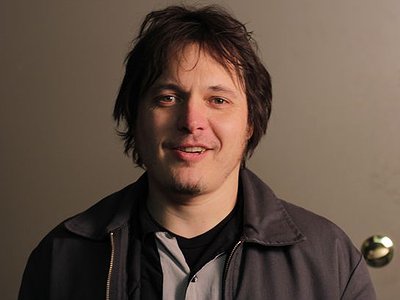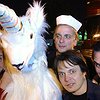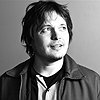When did you start writing/producing music - and what or who were your early passions and influences?
My first memories of 'writing' music are of constructing some sort of dramatic narrative on a neighbor's upright piano probably around the age of eight. I also recall messing around on my older brother's guitar with the top three strings in first position, which I now recognize as a simple way to connect triads with pivot tones. I was also writing lyrics to songs that didn't exist while in grammar school.
Much of all of this probably had a lot to do with being inspired by my brother and the influence of Kiss records that he would bring home in the late '70s. A few years later, after starting electric bass and immediately getting into a band, thanks to my teacher hooking me up with a guitar player student whose brother was a drummer, I began writing actual songs. My passions at that point included Blondie, Cheap Trick, Van Halen, college radio and the Dr. Demento show.
What do you personally consider to be the incisive moments in your artistic work and/or career?
Seeing Kiss at the Cow Palace in 1979 and X at Mojo's in 1980, hearing Jaco Pastorius for the first time. Mingus' Ah Um, Miles Davis' Nefertiti, Slayer's Reign In Blood, Stravinsky's Rite Of Spring. Peter Maxwell Davies' Eight Songs For A Mad King. Seeing The Art Ensemble of Chicago in 1988, playing with jazz drummers, seeing Tim Berne's Fractured Fairytales on Night Music.
Aside from those outside moments I also consider that being unbiased about genres at a young age led me to incisive moments like making a connection between disparate musics. For instance, realizing that harmonic changes in classical music could be utilized in death metal. In other words, realizing at an early age that what I enjoy in music has nothing to do with genre.
What are currently your main compositional- and production-challenges?
Learning software and trying to become efficient at being my own recording engineer while maintaining my technique on contrabass. Also, balancing being a musician with being a composer, which are two completely different mindsets that both require a lot of time and energy.
What do you usually start with when working on a new piece?
The first thing that comes to mind is the ensemble; the orchestration. I do have scraps of material lying around which were written without an instrument in mind. I have no idea where these will end up. But when it comes to tackling a specific piece, I have to know what I'm writing for. From there I begin to think conceptually; where the piece is going to go and how it's going to get there, what shape it is going to take. All very structural but non-musical ideas.
How strictly do you separate improvising and composing?
I don't necessarily. Another term for improvising is 'spontaneous composition'. Harnessing or 're-writing' improvisation can be a major part of composition, if not all of it. Improvising happens quickly and haphazardly whereas composing is a slow, drawn out, analytical process. Both are coming from the same muse although the former may be more emotionally based.
Improvising often has to do with searching, where composing is more about finding. In the past I have composed improvisations as roadmaps and direction to aim for within an improvisation, as well as placed improvisation within a composition. And I have separated the two completely. I don't follow any strict rule about how these two forms should co-exist.
How do you see the relationship between sound, space and composition?
Being someone who plays both acoustic and amplified music I am constantly aware of the challenges of acoustics, rental gear and the changing environments in which I play. One of the worst feelings, which I experience all too often, is not being able to convey a musical idea due to poor acoustics, an inept sound engineer or flawed or unfamiliar equipment.
When it comes to composition, the piece initially exists in the vacuum of the mind, the perfect environment, which of course does not exist in reality. So, sound and space can water down the composition making the relationship between these three things dysfunctional. Recordings, on the other hand, though possibly clear and idealistic, are not necessarily representative of reality either. Ultimately I think it is rare, if not impossible, for a composition to be heard by an audience in the way it was conceived in someone's brain.
Do you feel it important that an audience is able to deduct the processes and ideas behind a work purely on the basis of the music? If so, how do you make them transparent?
I don't think it's important for the processes to be understood at all. In fact, it is desirable that they are not even perceptible. Music should be enjoyed on a purely musical level. No program, popularity, or system should be a factor in whether one finds something good and interesting or not, at least not the only factor. There is certainly good music that comes from no process.
To make a process transparent is to turn the music into an exercise. Exercises are great for analysis, education, and progress, but don't necessarily make for a good listening experience. Ideas are another story. If a musical idea is not clear then it is lost on the listener and might as well not exist at all.
The question of 'why?' never needs to be answered in music or rather, good music should never beg that question. But if an idea, especially a new one, is clear then the question of 'what?' will be a means to discovery. An audience should be able to hear ideas but whatever goes beyond that is out of the composer's hands.




